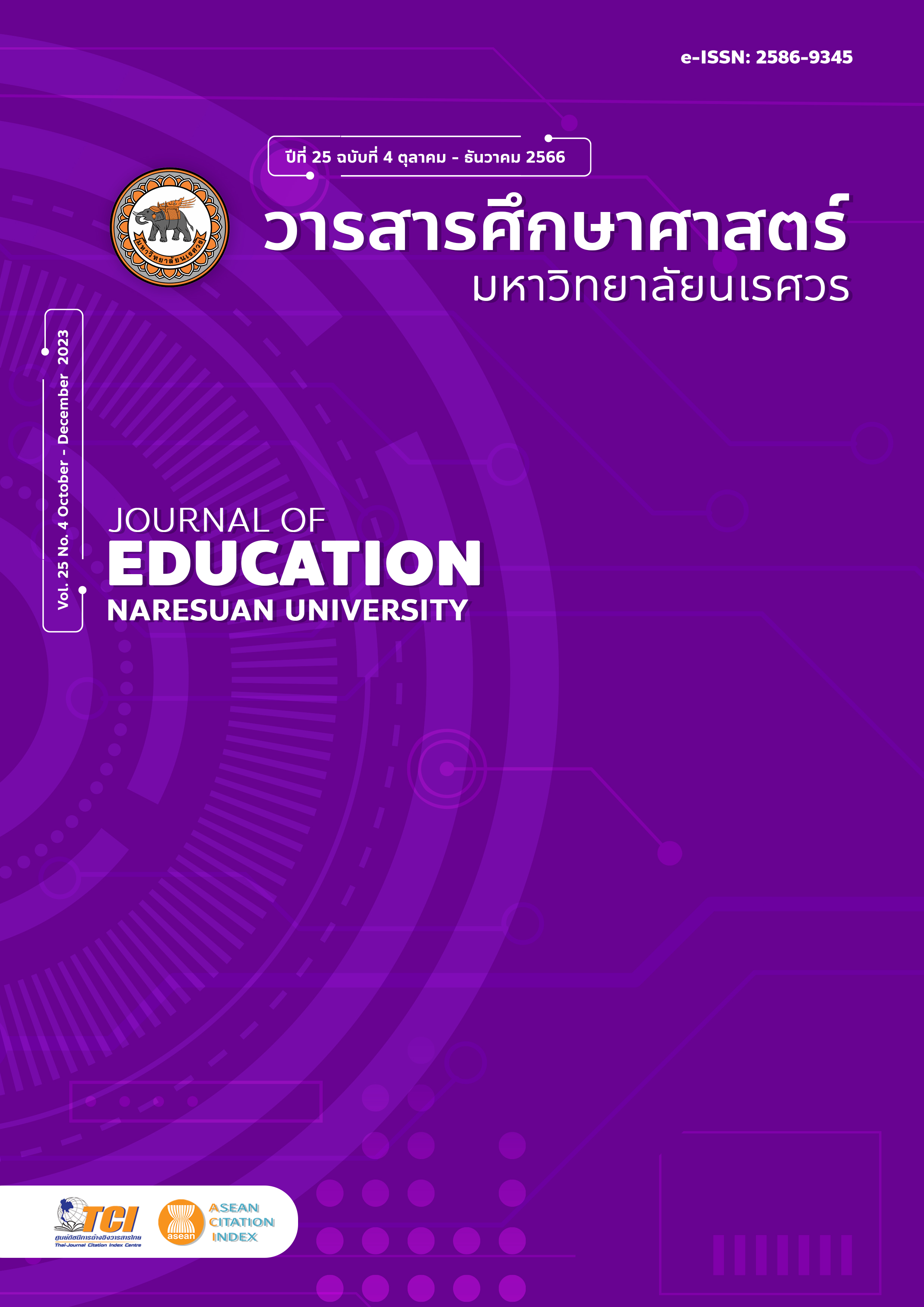EFFECT OF AN INSTRUCTIONAL MODEL INTEGRATING WEBQUEST AND FIVE KEY QUESTIONS OF SOCIAL MEDIA LITERACY TO ENHANCE SECONDARY SCHOOL STUDENTS' CRITICAL READING AND REASONING WRITING ABILITIES
Main Article Content
Abstract
The purposes of this study were 1) to compare the level of students’ critical reading ability before and after the implementation of an instructional model integrating WebQuest and five-key questions of social media literacy and 2) to study reasoning writing skill development of secondary school students using an instructional model integrating WebQuest and five-key questions of social media literacy. The participants of this study were 39 ninth-grade students. The duration of the experiment was eight weeks. The research instruments of this study were 1) an instructional model integrating WebQuest and five-key questions of social media literacy and 2) lesson plans designed according to the newly constructed model. The data collection instruments consisted of critical reading and reasoning writing abilities measurement. The data were analyzed using mean, percentage, standard deviation, t-test, and relative change score. The results of this study were as follows: 1) the students’ average critical reading ability after learning with an instructional model integrating WebQuest and five-key questions of social media literacy was higher than before at the significant level of .05 and 2) the results of studying reasoning writing skill development using relative change score of secondary school students revealed that 36 students (92.31%) had higher scores and three students (7.69%) had the same scores.
Article Details

This work is licensed under a Creative Commons Attribution-NonCommercial-NoDerivatives 4.0 International License.
The owner of the article does not copy or violate any of its copyright. If any copyright infringement occurs or prosecution, in any case, the Editorial Board is not involved in all the rights to the owner of the article to be performed.
References
Battelle for Kids. (2019). Frameworks & Resources. Retrieved April 20, 2019, from http://battelleforkids.org/networks/p21/frameworks-resources
Bunkongsen, S. (2006). Effect of Thai language teaching using inquiry strategies on critical thinking and critical reading abilities of mathyom suksa six students (Master Thesis). Bangkok: Chulalongkorn University. [in Thai]
Center for Media Literacy. (2005). Five key questions of media literacy. Retrieved April 23, 2019, from www.medialit.org
Chanakitjanukit, C. (2007). Effects of inquiry-based learning on web with different types of cooperative learning upon lower secondary students’ learning achievement and participations behaviors in social studies, religious, and culture subject area (Master Thesis). Bangkok: Chulalongkorn University. [in Thai]
Chhouk, C. (2017). Development of an instructional model integrating WebQuest learning approach and reflective practice to enhance English critical reading ability of undergraduate students in Cambodia (Doctoral dissertation). Bangkok: Chulalongkorn University. [in Thai]
Dodge, B. (1997). Some thoughts about WebQuests. Retrieved April 23, 2019, from http://webquest.sdsu.edu/about_webquest.html
Electronic Transactions Development Agency (ETDA). (2018). Thailand internet user profile 2018. Bangkok: Electronic Transactions Development Agency (ETDA) Ministry of Digital Economy and Society. [in Thai]
Kanjanawasee, S. (1995). Measurement of change. In The 3rd workshop on principles and advanced research methods specific to research and development of Thai behavior systems. Bangkok: Chulalongkorn University Printing House. [in Thai]
Khemmani, T. (2014). Science of teaching: Knowledge of efficient learning process management (18th ed.). Bangkok: Darn Sutha Press. [in Thai]
Office of Knowledge Management and Development. (2017). 21st century skills. Retrieved March 12, 2021, from http://www.okmd.or.th/okmd-opportunity/new-gen/262/ [in Thai]
Office of the National Digital Economy and Society Commission. (2020). Results and Indexing indicators of Research project Thailand digital outlook Phase 2 Digital development of Thailand 2020. Retrieved April 23, 2021, from https://drive.google.com/file/d/1HeES8w1TfYRhl6Sas8nU9vndivIFxiJN/view. [in Thai]
Post Today. (2017). Thai No.1 world comments. Retrieved April 20, 2019, from https://www.posttoday.com/it/481316 [in Thai]
Suwannatthachote, P. (2008). Searching knowledge and developing thinking skill by WebQuest. In Dechakup, P., Hongphanut, R., & Suwannatthachote, P. (Eds.), Compose articles, development strategies, thinking: Self immunity (pp. 1-15). Bangkok: Institute of Academic Development (IAD). [in Thai]
Thailand Computer Emergency Response Team (ThaiCERT). (2019). Statistic of Menace 2019. Retrieved April 20, 2019, from https://www.thaicert.or.th/statistics/statistics2019.html. [in Thai]
The Institute for the Promotion of Teaching Science and Technology. (2019). Assessment results of PISA 2018: results for executive. Bangkok: The Institute for the Promotion of Teaching Science and Technology (IPST). [in Thai]
Tufts University. (2019). Social Media Overview. Retrieved April 23, 2019, from https://communications.tufts.edu/marketing-and-branding/social-media-overview/
Yenjabok, P. (2003). Media literacy. Journal of Studies in the Field of Humanities Faculty of Humanities, Kasetsart University, 11, 111-121. [in Thai]


